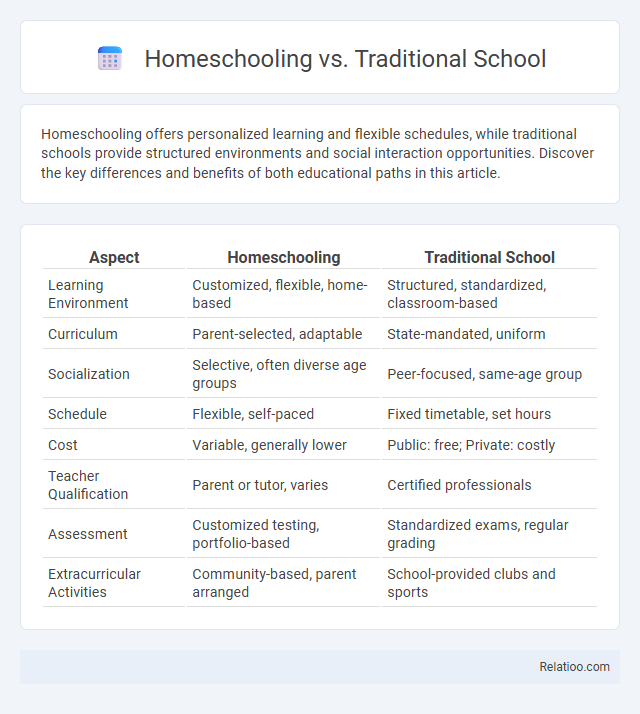Homeschooling offers personalized learning and flexible schedules, while traditional schools provide structured environments and social interaction opportunities. Discover the key differences and benefits of both educational paths in this article.
Table of Comparison
| Aspect | Homeschooling | Traditional School |
|---|---|---|
| Learning Environment | Customized, flexible, home-based | Structured, standardized, classroom-based |
| Curriculum | Parent-selected, adaptable | State-mandated, uniform |
| Socialization | Selective, often diverse age groups | Peer-focused, same-age group |
| Schedule | Flexible, self-paced | Fixed timetable, set hours |
| Cost | Variable, generally lower | Public: free; Private: costly |
| Teacher Qualification | Parent or tutor, varies | Certified professionals |
| Assessment | Customized testing, portfolio-based | Standardized exams, regular grading |
| Extracurricular Activities | Community-based, parent arranged | School-provided clubs and sports |
Understanding Homeschooling and Traditional School
Understanding homeschooling and traditional school involves recognizing how each educational approach aligns with children's developmental stages. Homeschooling allows personalized pacing and tailored learning experiences to suit your child's cognitive, emotional, and social growth phases, fostering individualized development. Traditional schools provide structured curricula and social interaction opportunities that support age-related learning milestones and group dynamics essential for developmental progress.
Key Differences Between Homeschooling and Traditional School
Homeschooling offers personalized learning tailored to a child's developmental stage, allowing flexibility in pacing and curriculum choices that align with individual cognitive and emotional readiness. Traditional schools follow standardized curricula designed to meet general developmental benchmarks, providing structured environments with socialization opportunities among peers. Key differences include the adaptability of homeschooling to a child's unique growth patterns versus the fixed schedules and group-based learning typical of traditional education.
Academic Outcomes and Performance
Academic outcomes vary significantly between homeschooling and traditional school settings due to differences in developmental stage targeting and personalized learning approaches. You benefit from homeschooling's ability to tailor curriculum pacing and content to your child's specific developmental needs, often resulting in higher academic performance and mastery of subjects. Traditional schools provide structured environments with standardized assessments, which may not align with every student's developmental stage, potentially impacting overall academic achievement.
Socialization: Myths and Realities
Socialization in homeschooling often challenges the myth that homeschooled children lack peer interaction; research shows they engage in diverse community activities promoting social skills development. Traditional schools provide structured social environments, but can also limit exposure to varied age groups and real-world scenarios critical for social adaptability. Understanding developmental stages highlights that socialization effectiveness depends more on quality and context of interactions rather than the learning setting alone.
Flexibility and Individualized Learning
Homeschooling offers unparalleled flexibility, allowing curriculum and pace to be tailored to a child's unique developmental stage, which supports individualized learning more effectively than traditional school structures. Traditional schools follow standardized schedules and group instruction that may not accommodate every student's developmental needs or learning preferences. Personalized education in homeschooling fosters deeper engagement and adaptation to cognitive and emotional growth milestones, optimizing academic outcomes.
Parental Roles and Responsibilities
Parental roles in homeschooling involve direct instruction, personalized curriculum development, and continuous progress monitoring aligned with the child's developmental stage, fostering individualized cognitive and emotional growth. In contrast, parents in traditional schooling primarily support learning through reinforcement, communication with educators, and facilitating extracurricular activities, ensuring alignment with developmental benchmarks set by academic institutions. Understanding developmental stages empowers parents to adapt their involvement, promoting optimal social, psychological, and educational outcomes regardless of the schooling method chosen.
Cost Comparison: Homeschooling vs Traditional School
Homeschooling typically offers a more cost-effective option compared to traditional schools, with expenses mainly involving curriculum materials and supplementary resources, whereas traditional schools often include tuition, uniforms, and additional fees. Your homeschooling budget can be tailored to prioritize learning tools and activities that align with your child's developmental stage without the overhead costs of institutional schooling. Evaluating these financial differences helps you make an informed choice that balances educational quality and affordability.
Legal Requirements and Accreditation
Your choice between homeschooling and traditional school impacts the legal requirements and accreditation standards that must be met to ensure educational legitimacy. Homeschooling laws vary significantly by state, often requiring registration, curriculum approval, and standardized testing, while traditional schools follow strict accreditation protocols set by regional or national education authorities. Understanding developmental stages is crucial for tailoring legal compliance and accreditation criteria to support your child's educational progress effectively.
Extracurricular Activities and Opportunities
Extracurricular activities in homeschooling offer personalized and flexible options tailored to your child's developmental stage, fostering creativity and independence through community-based clubs, sports, and arts programs. Traditional schools provide structured opportunities with diverse teams, music ensembles, and academic clubs that promote social skills and teamwork, essential for developmental milestones. Comparing both, your child's growth benefits most when extracurricular options align with their interests and developmental needs, encouraging balanced cognitive, social, and emotional development.
Choosing the Right Educational Path for Your Child
Choosing the right educational path for your child requires understanding the impact of homeschooling, traditional school, and developmental stage on their learning outcomes and social growth. Research indicates that homeschooling offers personalized instruction tailored to developmental milestones, while traditional schools provide structured environments fostering peer interaction and standardized curricula. Evaluating your child's unique cognitive, emotional, and social needs ensures an informed decision that supports optimal educational and developmental success.

Infographic: Homeschooling vs Traditional School
 relatioo.com
relatioo.com